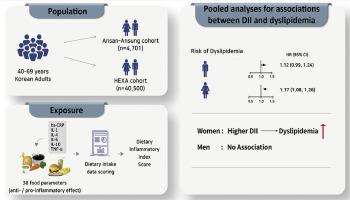膳食炎症指数得分越高,只有女性患血脂异常及其组成部分的风险越高
IF 3.1
3区 医学
Q2 NUTRITION & DIETETICS
引用次数: 0
摘要
膳食炎症指数(DII)是一种评估膳食炎症潜力的工具。我们的研究假设,DII 分数越高,患血脂异常的风险就越大,而且这一结果可能因性别而异。研究使用了韩国基因组与流行病学研究的数据。分析对象包括来自 HEXA 研究(n = 40,500 人)和 Ansan-Ansung 研究(n = 4701 人)的 40 至 69 岁的参与者。HEXA研究的平均随访时间为5.03年,安山-安星研究的平均随访时间为8.14年。DII 评分是根据饮食数据计算得出的。Cox 比例危险回归分析用于计算危险比(HR)和 95% 置信区间(CI)。在汇总分析中,DII 分数越高,患血脂异常及其组成部分的风险越高。性别特异性分析显示,只有女性存在相关性。DII 评分越高,说明饮食中含有促炎物质,这与高胆固醇血症、高低密度脂蛋白胆固醇血症、高甘油三酯血症和血脂异常的风险增加有关,HR 为 1.17(95% CI:1.06,1.29)、1.16(95% CI:1.03,1.29)、1.32(95% CI:1.12,1.52)和 1.17(95% CI:1.08,1.26)。然而,在男性中,DII 与血脂异常之间没有关联。这些发现强调了现有膳食模式在影响血脂异常和相关健康问题发展方面的炎症特征。要确定 DII 评分如何影响血脂异常风险的机制,还需要进一步的研究。本文章由计算机程序翻译,如有差异,请以英文原文为准。

A higher dietary inflammatory index score is associated with an increased risk of developing dyslipidemia and its components only in women
The dietary inflammatory index (DII) is a tool to evaluate the inflammatory potential of diets. Our research hypothesized that a higher DII score would be associated with an increased risk of dyslipidemia and that this outcome may differ by sex. Data from the Korean Genome and Epidemiology Study were used. The analysis included participants aged 40 to 69 years from the HEXA study (n = 40,500) and the Ansan-Ansung study (n = 4701). The mean follow-up was 5.03 years for the HEXA study and 8.14 years for the Ansan–Ansung study. The DII scores were calculated based on dietary data. Cox proportional hazards regression analysis was used to calculate hazard ratio (HR) and 95% confidence interval (CI). In pooled analyses, a high DII score was associated with a higher risk of dyslipidemia and its components. Sex-specific analyses revealed associations only in women. A pro-inflammatory diet, as indicated by a higher DII score, was associated with an increased risk of hypercholesterolemia, hyper-low-density lipoprotein cholesterolemia, hypertriglyceridemia, and dyslipidemia, with HR of 1.17 (95% CI: 1.06, 1.29), 1.16 (95% CI: 1.03, 1.29), 1.32 (95% CI: 1.12, 1.52), and 1.17 (95% CI: 1.08, 1.26), respectively. However, among men, there was no association between DII and dyslipidemia. These findings emphasize the inflammation feature of existing dietary patterns in influencing the development of dyslipidemia and related health issues. Further research will be needed to identify the mechanisms of how DII scores affect the risk of dyslipidemia.
求助全文
通过发布文献求助,成功后即可免费获取论文全文。
去求助
来源期刊

Nutrition Research
医学-营养学
CiteScore
7.60
自引率
2.20%
发文量
107
审稿时长
58 days
期刊介绍:
Nutrition Research publishes original research articles, communications, and reviews on basic and applied nutrition. The mission of Nutrition Research is to serve as the journal for global communication of nutrition and life sciences research on diet and health. The field of nutrition sciences includes, but is not limited to, the study of nutrients during growth, reproduction, aging, health, and disease.
Articles covering basic and applied research on all aspects of nutrition sciences are encouraged, including: nutritional biochemistry and metabolism; metabolomics, nutrient gene interactions; nutrient requirements for health; nutrition and disease; digestion and absorption; nutritional anthropology; epidemiology; the influence of socioeconomic and cultural factors on nutrition of the individual and the community; the impact of nutrient intake on disease response and behavior; the consequences of nutritional deficiency on growth and development, endocrine and nervous systems, and immunity; nutrition and gut microbiota; food intolerance and allergy; nutrient drug interactions; nutrition and aging; nutrition and cancer; obesity; diabetes; and intervention programs.
 求助内容:
求助内容: 应助结果提醒方式:
应助结果提醒方式:


